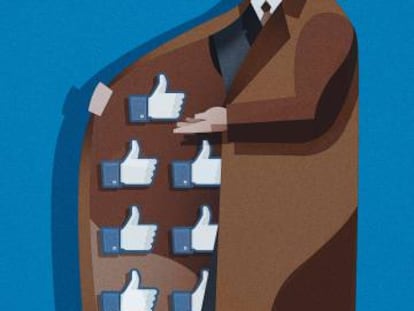The globalization of polarization
Democracies seem to be suffering from a type of ¡°political autoimmune disease¡± ¨C as part of each society wages war on the rest of the social body

The government of the world¡¯s superpower is at a standstill, while the government of a former superpower ¨C the United Kingdom ¨C sits paralyzed after suffering a barrage of self-inflicted wounds. Angela Merkel, who was until recently the most influential European leader, is heading toward retirement. Her French colleague faces a surprising social uprising by the now famous ¡°Yellow Vests.¡± Italy, the country with the seventh-largest economy in the world, is now governed by a fragile coalition whose leaders are so diametrically opposed and whose declarations are so perplexing that we are left not knowing whether to laugh or to cry. It appears that the Italians have decided to see what it¡¯s like when government mismanagement is pushed to its most extreme limits. Meanwhile, the Spanish prime minister wasn¡¯t even elected to office thanks to his party enjoying a parliamentary majority, but instead arrived there with the help of a tortuous legislative process. In Israel, the only democracy in the Middle East, the prime minister faces indictment for corruption, fraud and other charges. In the coming months Benjamin Netanyahu could either be re-elected or sent to jail.
The closing of important parts of the US government is only the latest and most-revealing consequence of the spreading disease
All these countries seem to be suffering from a type of ¡°political autoimmune disease¡±¨C as part of each society wages war on the rest of the social body. The root cause of the disease is the polarization of society and, by extension, its politics. What¡¯s also clear is that the disease is spreading and is very contagious. This does not mean that polarization didn¡¯t exist before, only that it is becoming much more acute and could prove deadly, as evidenced by all these extreme examples of governmental dysfunction. The closing of important parts of the US government is only the latest and most-revealing consequence of the spreading disease. Indeed, in all likelihood this type of government paralysis and chaos could soon become the norm.
Before, democratic governments managed to reach agreements with their opponents or could organize coalitions that allowed them to make decisions and effectively govern. Now, political rivals often mutate into irreconcilable enemies, which makes agreements, compromises or coalitions impossible. Polarization is a pandemic that has gone global and is now manifesting itself in most of the world¡¯s democracies.
Social networks such as Twitter and Instagram only allow short messages. Such brevity privileges extremism
To what do we owe this fragmentation of so many societies into diverse groups who are completely intolerant of one another? The increase in economic inequality, growing economic uncertainty, and a sense of social injustice are undoubtedly some of the causes of political polarization. The popularity of social networks and the crisis of journalism and the traditional media also help to encourage it. Social networks such as Twitter and Instagram only allow short messages. Such brevity privileges extremism, since the shorter the message, the more radical it must be for it to ¡°go viral.¡± On social networks there is no space, nor time or patience for grays, ambivalence, nuances, or the possibility for conflicting viewpoints to find common ground. Everything is either very white or very black. And, of course, this favors sectarianism and makes it more difficult to reach agreements.
But there is more. Polarization is not only caused by belligerent tweets and resentment over inequality. The rise of anti-politics ¨C or the total repudiation of politics and traditional politicians ¨C is another important catalyst for polarization. Political parties now face a plethora of new competitors (¡°movements,¡± ¡°collectives,¡± ¡°tides,¡± ¡°factions,¡± NGOs) whose agenda is based on the repudiation of the past and who peddle in the rhetoric of intransigence. Ironically, to retain followers and be electorally competitive, traditional political parties must also adopt positions shaped by anti-politics. In addition, many of these new players entice followers who are attracted to the idea of belonging to political organizations made up of people with whom they share a certain identity. This identity can be religious, ethnic, regional, linguistic, sexual, generational, rural, urban, etc. The assumption is that the identity that unites adherents to a political group generates similar interests and preferences. As identity tends to be more permanent and less fluid than ¡°normal¡± political positions, this type of political group finds it more difficult to make concessions on issues that concern the identity of its members. This naturally makes them inflexible and, as we know, rigidity and polarization tend to go together.
Political polarization will not be alleviated very soon. Many of its causes are powerful and unstoppable
Political polarization will not be alleviated very soon. Many of its causes are powerful and unstoppable. And now it has been globalized.
The hope is that in the same way that polarization generates paralysis in governments or a toxic political environment, it can also produce changes and ruptures in countries with corrupt, mediocre and ineffective political systems. Like cholesterol, which can be good and bad, there are cases in which political polarization can have positive effects.
I hope there are many.
Tu suscripci¨®n se est¨¢ usando en otro dispositivo
?Quieres a?adir otro usuario a tu suscripci¨®n?
Si contin¨²as leyendo en este dispositivo, no se podr¨¢ leer en el otro.
FlechaTu suscripci¨®n se est¨¢ usando en otro dispositivo y solo puedes acceder a EL PA?S desde un dispositivo a la vez.
Si quieres compartir tu cuenta, cambia tu suscripci¨®n a la modalidad Premium, as¨ª podr¨¢s a?adir otro usuario. Cada uno acceder¨¢ con su propia cuenta de email, lo que os permitir¨¢ personalizar vuestra experiencia en EL PA?S.
?Tienes una suscripci¨®n de empresa? Accede aqu¨ª para contratar m¨¢s cuentas.
En el caso de no saber qui¨¦n est¨¢ usando tu cuenta, te recomendamos cambiar tu contrase?a aqu¨ª.
Si decides continuar compartiendo tu cuenta, este mensaje se mostrar¨¢ en tu dispositivo y en el de la otra persona que est¨¢ usando tu cuenta de forma indefinida, afectando a tu experiencia de lectura. Puedes consultar aqu¨ª los t¨¦rminos y condiciones de la suscripci¨®n digital.











































